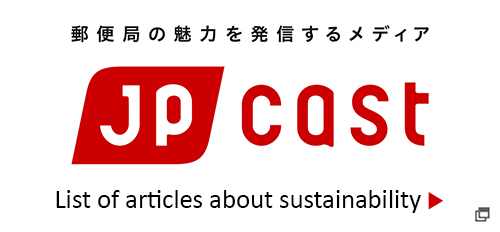- Position:
- Home

- English Home

- JP group Sustainability

- Society

- Creating Friendly Workplaces for Employees
Creating Friendly Workplaces for Employees



To remain a corporate group that everyone can enjoy working for and where everyone is treated with respect
We see a growing need to develop a labor environment where everyone is treated with respect irrespective of gender, age, disability or nationality. Workstyle reforms have been in progress in recent years to enable everyone to enjoy working. Examples include the encouragement of different workstyles to help maintain a healthy work-life balance and the elimination of long work hours.
Promoting a healthy work-life balance
The Japan Post Group is also working to establish programs and a workplace climate that provides employees with diverse workstyle options to choose from according to their life stage.
Formulation of a general employer action plan based on the Act on Advancement of Measures to Support Raising Next-Generation Children (Next Generation Act)
The Japan Post Group formulated its general employer action plan based on the Next Generation Act and is committed to enabling employees to balance work and their home lives. All companies of the group publish their general employer action plan on the Work-life Balance Support Forum of the Ministry of Health, Labour and Welfare's website.
Work-life Balance Support Forum website (Ministry of Health, Labour and Welfare: Japanese)
Balancing Work with Childcare, Nursing Care, and Illness
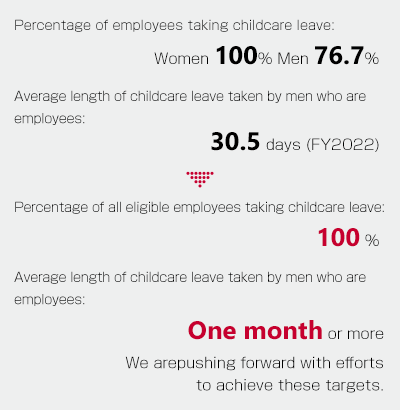
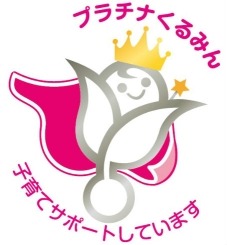
Regarding childcare and nursing care, we have established a support system exceeding the legal obligation and is implementing various support measures so that both male and female employees can continue working during times they are needed at home, including from pregnancy to childbirth, for childcare, and for nursing family members.
In particular, by making it mandatory for male employees to take the paid leave portion (3 days) of childcare leave and for managers to encourage male employees to take leave and to confirm the employees' wishes regarding childcare leave (4 weeks or more) with the aim of achieving a "father's childcare leave rate of 100%," we are working to spread understanding in order to foster an organizational culture in which it is normal for both men and women to take childcare leave.
More specifically, full-time employees may take up to three years of childcare leave, up to nine years of partial childcare leave (12 years if the baby has a disability ) and up to one year of nursing care leave. In October 2018, the Japan Post Group also started partly paying for childcare leave, allowing employees on fertility treatment to take leave and rehiring employees who retired due to cancer treatment.
apan Post Bank and Japan Post Insurance obtained the Ministry of Health, Labour and Welfare's Platinum Kurumin Certification for excellently supporting the raising of children.
Employees that are women may take a total of 14 weeks of maternity leave before and after giving birth. (If they are full-time employees, they can be paid during that time.)
With regard to employee healthcare treatment, we are taking steps to improve work environments and a work-life balance, including the enhancement of sick leave, the leave system, and the leave for infertility treatments so that employees can continue working with peace of mind.
In the fiscal year ending March 31, 2024, as further promotion measures, we will implement measures to improve the work environment by deploying initiatives to deepen the understanding of such conditions as menopause, by sharing basic information on menopause at the workplace, raising awareness of the poor physical health that may afflict this generation, and improving the health literacy of those employees who are themselves suffering from menopause.
Measures, etc. for supporting employees in their balancing of work and childcare
| Measures, etc. | Child's age | Details |
|---|---|---|

|
||
| Paying for three days of childcare leave |

|
Employees who have not taken maternity leave may be paid for the first three days of their childcare leave from the child's birth to the day after eight weeks have passed since the child's birth. Eligible employees need to request to be paid for the first three days. Note: Limited to full-time employees and rehired elderly employees |
| Child care leave at birth |

|
Employees who have not taken maternity leave may take childcare leave at birth for four weeks (28 days) from the child's birth to the day after eight weeks have passed since the child's birth. |
| Childcare time |

|
Employees raising a child younger than one year old may spend 45 minutes of their work hours twice a day taking care of the child, which may also be combined to 90 consecutive minutes. |
| Childcare leave |

|
Employees raising a child younger than three years old may take childcare leave until the day the child becomes three years old. (Or until the child becomes one year old if the employee has been hired for a specific period. By satisfying criteria such as both the employee and the employee's spouse are taking childcare leave, the employee may take childcare leave until the child becomes one year and two months old. By satisfying criteria such as the child being unable to enter preschool, the employee may take childcare leave until the child becomes two years old.) |
| Partial childcare leave |

|
Partial childcare leave may be taken by shortening work days two hours or less, until March 31 of the year when the child becomes nine years old. (Or until the end of the year the child becomes 12 years old if the child has a disorder, a chronic disease or a similar problem) |
| Child nursing care leave |

|
Employees raising a child that has not yet entered elementary school may take up to five days of leave per year (or ten days if they have two or more children) to take care of children who are injured or sick. |
| Limitations on late-night work |

|
Employees raising a child that has not yet entered elementary school may request to decline late-night work. |
| Limitations on overtime work |

|
Employees raising a child that has not yet entered elementary school may request to limit overtime work to 24 hours or less per month and 150 hours or less per year. |
| Exemption from overtime, etc. |

|
Employees raising a child that has not yet entered elementary school may request to be exempted from working overtime or working on regular days off. |
| Subsidies for babysitters and temporary use of childcare facilities |

|
Fees to provide a babysitter for a child under school age payable to a general welfare service and fees for temporarily leaving a child with a childcare facility may be subsidized (up to 60 yearly tickets for a 700-yen subsidy for childcare useable for one hour of childcare). |
| Childcare consultations |
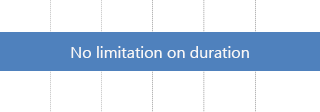
|
General welfare services (childcare/nursing care telephone consultations) and childcare telephone consultations provided by the Japan Post Mutual Aid Association are available for free. |
Measures, etc. to support employees balancing work and nursing care
| Measures, etc. | Period | Details |
|---|---|---|

|
||
| Limitations on late-night work |
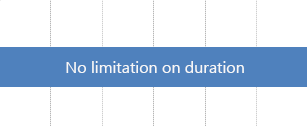
|
Employees taking care of a person in need of nursing care may request to decline late-night work. |
| Limitations on overtime work |
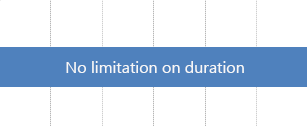
|
Employees taking care of a person in need of nursing care may request to limit overtime work to 24 hours or less per month and 150 hours or less per year. |
| Exemption from overtime, etc. |
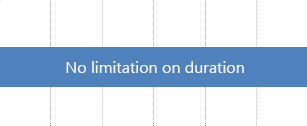
|
Employees taking care of a person in need of nursing care may request to be exempted from working overtime or working on regular days off. |
| Caregiving leave |
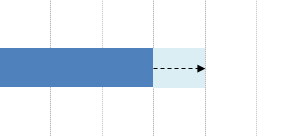
|
Employees taking care of a person in need of nursing care may take up to a total of 183 days of caregiving leave per care receiver until that person no longer needs nursing care. If the company deems the circumstances to be extraordinary, employees may take one year or less of caregiving leave from the day the leave starts. (Or a total of 93 days if the employee has been hired for a specific period) |
| Partial caregiving leave |

|
Employees taking care of a person in need of nursing care may take partial caregiving leave for four consecutive hours from the start of a workday or for four consecutive hours before the end of a workday for three years or less after the leave begins. |
| Caregiver days off |

|
Employees engaging in activities such as taking care of a person in need of nursing care may take five or fewer days off per year (or ten days in case taking care of two or more people in need of nursing care) to take care of people in need of nursing care or provide other kinds of necessary care. |
| Nursing care subsidy |
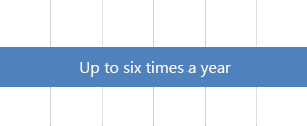
|
The cost of nursing care for an employee certified as needing assistance or nursing care (or with a request for such certification pending) or their family member within the second degree of consanguinity may be subsidized for the amount exceeding the nursing care insurance payment limit. |
| Consultation on nursing care |
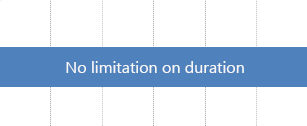
|
General welfare services (childcare/nursery care telephone consultations) and consultations regarding nursing care provided over the telephone by the Japan Post Mutual Aid Association and the Federation of National Public Service Personnel Mutual Aid Associations are available for free. |
Reducing Overtime Work, Promoting Telework

We are making efforts to reduce overtime through improved work efficiency (utilization of RPA* and AI, revised job descriptions) and introduce a system of an interval between working.
We have been promoting telework with the aim of improving business productivity and realizing diverse work styles, and will further improve the environment for telework.
- *Robotic Process Automation, the automation of business operations mainly using software robots
Measures to support work-life balance
Improvement of guidebooks, etc.
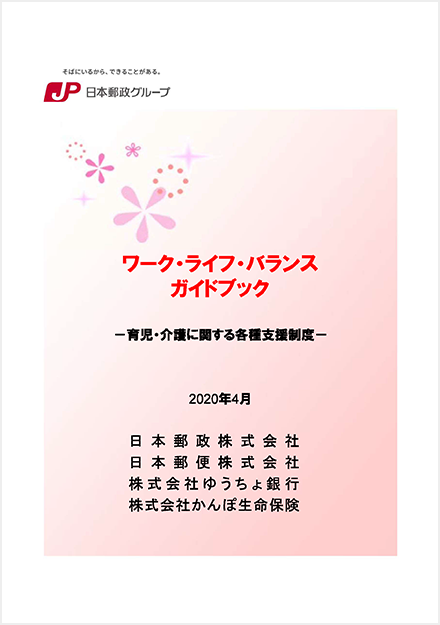
The Japan Post Group distributes the Work-life Balance Guidebook to all employees and also created a website to communicate information about balancing work and life for the employees of Japan Post Group companies to exchange information with one another.
We are implementing initiatives to help the employees of Japan Post Group companies balance their work and home lives. Examples include organizing seminars about balancing childcare, nursing care and work, among other initiatives.
Seminars on balancing work and childcare
To help employees to balance work and childcare, the Japan Post Group organizes seminars titled Think with your Partner about Balancing Childcare and Work, which employees, etc. can attend during childcare leave with their partners and children.
The seminars feature lectures called Let's Find Your Favorite Moments in Work and Childcare! by an outside specialist invited to discuss topics such as workstyles and career development in childcare years. In addition, attendees study in groups and share thoughts and findings about their attitudes toward work and childcare, tips for balancing work and childcare and the joy and anxieties of caring for children with each other. At the end of the seminars, our internal childcare-related support programs are introduced and guidance on the use of our welfare services is given.
Feedback from participants
"I had an opportunity to listen to opinions that were different from mine on topics such as childcare and careers. It was an inspiring experience. After returning home, I will talk with my partner about the topics discussed here."
Seminars on working while providing nursing care

To help employees to balance work and nursing care, the Japan Post Group organizes Seminars on Working while Providing Nursing Care. For the seminars, outside speakers are invited to explain the administrative and other services available to employees who have to take care of a family member or relative while continuing to work. Furthermore, during the seminars, information is shared about internal systems for supporting nursing care and welfare services.
Videos from the seminars have been made available for viewing since 2021 so employees can watch and learn from them at any time.
Manager awareness reform
As the social situation has changed in recent years, employees' workstyles have also become more diverse. To empower employees caring for children or other family members, it is necessary for the managers in the workplace to understand the situation. Japan Post is committed to reforming managers' awareness by, for example, introducing to the training program a curriculum designed to improve managers' management skills.
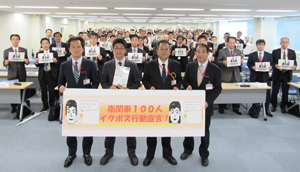
Japan Post joined the IkuBoss corporate alliance, run by Fathering Japan nonprofit organization, in January 2017 and organizes internal training sessions to increase employees' understanding of IkuBoss around the country.
Support and affiliation
Affiliation with IkuBoss Corporate Alliance

The Japan Post Group is affiliated with the IkuBoss corporate alliance run by Fathering Japan nonprofit organization and, based on the idea that ensuring that all employees continue to be energetic and happy is important, strives to develop attractive "IkuBosses*" who respect their subordinates' work-life balance, produce good results at work and are capable of enjoying their own work and private life.
- *IkuBosses are bosses who are willing to respect their subordinates' and colleagues' balance of work, childcare, nursing care and their personal lives and to understand the circumstances arising from this balance. (Excerpt from the Ministry of Health, Labour and Welfare website)
Supporting the 100% Paternity Leave Declaration
The Japan Post Group has expressed its support for the 100% paternity leave declaration promoted by Work Life Balance Co., Ltd. and implements initiatives to support people's balancing of work and childcare in pursuit of an environment that enables all men who are employees to take childcare leave.





